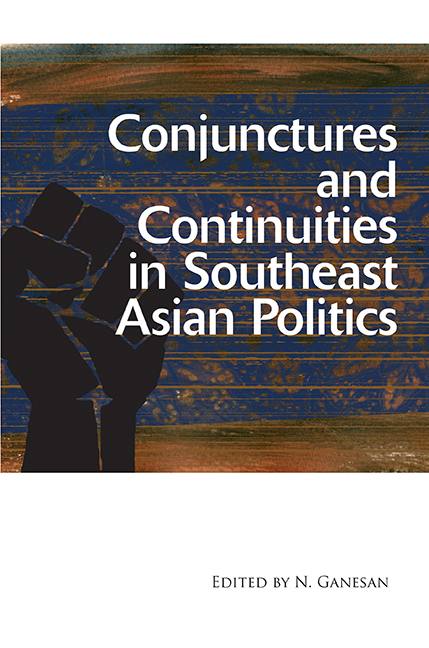Book contents
- Frontmatter
- Contents
- Acknowledgements
- List of Abbreviations
- Contributors
- 1 Conjunctures and Continuities in Southeast Asian Politics
- 2 (Re)Assessing the EDSA “People Power” (1986) as a Critical Conjuncture
- 3 The Road to Doi Moi in 1986: Domestic Dimensions
- 4 The 1988 Uprising in Myanmar: Historical Conjuncture or Praetorian Redux?
- 5 Cambodia's Historical Conjunctures and their Significance
- 6 Changing the Rules: Historical Conjuncture and Transition in Indonesia
- 7 The Resistible Rise of Thaksin Shinawatra: Crisis, Change and the Collapse of Thailand's Democracy
- 8 The March 2008 General Election in Malaysia as a Historical Conjuncture
- 9 Conclusion: Conjunctures and Continuities in Southeast Asia
- Index
8 - The March 2008 General Election in Malaysia as a Historical Conjuncture
Published online by Cambridge University Press: 21 October 2015
- Frontmatter
- Contents
- Acknowledgements
- List of Abbreviations
- Contributors
- 1 Conjunctures and Continuities in Southeast Asian Politics
- 2 (Re)Assessing the EDSA “People Power” (1986) as a Critical Conjuncture
- 3 The Road to Doi Moi in 1986: Domestic Dimensions
- 4 The 1988 Uprising in Myanmar: Historical Conjuncture or Praetorian Redux?
- 5 Cambodia's Historical Conjunctures and their Significance
- 6 Changing the Rules: Historical Conjuncture and Transition in Indonesia
- 7 The Resistible Rise of Thaksin Shinawatra: Crisis, Change and the Collapse of Thailand's Democracy
- 8 The March 2008 General Election in Malaysia as a Historical Conjuncture
- 9 Conclusion: Conjunctures and Continuities in Southeast Asia
- Index
Summary
This chapter argues that the twelfth general election of 8 March 2008 in Malaysia was a watershed political event, which may be appreciated as a historical conjuncture, following Ganesan. Certainly, 8 March altered significantly the political parameters of electoral politics and, as I have argued elsewhere, constituted or at least contributed to a reconfiguration of the political landscape in Malaysia. In terms of electoral politics, it may be suggested that 8 March created a de facto and perhaps a de jure two-party (or two coalition) system if one considers both the parliamentary and state levels of governance. The character of Malaysian federalism may have paradoxically allowed for such a development.
The event saw the ruling National Front (Barisan Nasional) government lose its two-thirds share of seats in parliament which it had held since Malaysia became independent in 1957. The opposition parties, later formalized as the People's Alliance (Pakatan Rakyat), won a total of 82 out of the 222 seats up for contest. The National Front barely won 50 per cent of the 7.9 million ballots cast, demonstrating that the electorate was virtually split down the middle. Furthermore, five state governments fell to opposition hands, unprecedented in Malaysian history. This essay argues that the political moment creating a two-party system in Malaysia was reinforced by several subsequently held by-elections after 8 March. The outcome of these by-elections indicates that the momentum and the factors that explain the 8 March result continue to drive current political developments. Factors driving Malaysia's new politics are both a function of its political transformations which have disembedded political legacies since arguably the 1980s and certainly after Anwar Ibrahim's sacking and incarceration in 1998. I suggest that while ethnicity remains a crucial variable in Malaysian politics, cross-ethnic voting represents the driver of Malaysia's new politics. Citizens across the board are now more informed of universal issues such as corruption and minority rights.
- Type
- Chapter
- Information
- Conjunctures and Continuities in Southeast Asian Politics , pp. 184 - 216Publisher: ISEAS–Yusof Ishak InstitutePrint publication year: 2013



